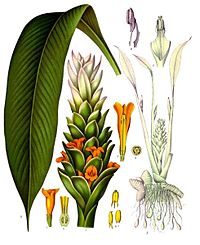Indian food.
We love it, crave it, seek out the best Indian restaurants
in the ‘hood’ but did you realize that you might actually be decreasing
your chances of developing Alzheimer’s or dementia when you consume it?
There is a compound found in turmeric called curcumin that is widely being studied for its powerful antioxidant properties. Turmeric has been used in Chinese and Ayurvedic medicine for centuries and is also used in other South Asian cuisines in countries like Nepal and Thailand.
According to Oregon State University Linus Paul Institute, “Curcumin /Turmeric is a spice derived from the rhizomes of Curcuma longa, which is a member of the ginger family (Zingiberaceae).”
If we look at other substances that are known to be powerful antioxidants and that have a just-as-powerful colored appearance, like blueberries, tomatoes (lycopene), carrots (beta-carotene), and pomegranates, we see that the trend continues when looking at curcumin.
The properties that give these antioxidants their beautiful colors are the same properties that make them beneficial to ingest, to our bodies, boasting the highest of antioxidant properties. Turmeric, known for it’s amazing, bright yellowish-orange color not only is used to spice food, it’s used to dye fabrics as well. Seems like a wonder spice, no?
Interestingly enough, not only does it taste good and provide amazing color, it can help with memory problems for those suffering from Alzheimer’s and those with HIV-induced dementia – and even other maladies such as cancer and cystic fibrosis although studies are very preliminary at this point in all areas.
Alzheimer’s patients have beta amyloid plaque that builds-up in the brain. Early studies show that curcumin helps prevent the build-up of that plaque and is actually helping to allow that plaque to break up and out of the brain. The bright yellow compound, when administered ground up into a capsule or through a tincture, over time, allows the beta amyloid plaque to help be removed and patients show a decreased progression in the disease. What does this mean?
TIME. And reduction of symptoms. Not only can some of the patients show an improvement in their dementia symptoms, they will also show a reduction on how quickly the disease spreads. Symptom generations slow speed depending on how well the patient responds to treatment. Patients who had an early diagnosis of Alzheimer’s showed significant slowed timetable regarding onset of symptoms.
Additionally, it is believed that those who use curcumin as a preventative treatment, those who are at risk for developing the disease, may have a reduced risk of developing it later in life.
Those who have HIV and are undergoing supplemental care with curcumin have showed that the onset of HIV-induced dementia is greatly reduced.
Blood flow to the brain is greatly improved when the patient is treated with Curcumin – in this case where the “patient” is a lab rat. Studies conducted on the lab rats saw a significant difference between the control group and those where were given the treatment when memory loss was induced. This is very promising for future human treatments. Preliminary studies on human patients are just as promising.
Seniors Health via Suite101.com reported on a “September 2009 European Neuropsychopharmacology article by Tauheed Ishrat et al entitled “Amelioration of cognitive deficits and neurodegeneration by curcumin in rat model of sporadic dementia of Alzheimer’s type (SDAT),” rats were given streptozotocin, which created significant memory problems, or cognitive deficits. The subjects that received supplemental curcumin experienced less memory loss with apparent oxidative potential.”
The part that is really desirable is that this is an affordable treatment. So many of the medications for these types of illnesses are so very expensive and hard to obtain in some cases, and if a patient is on experimental therapies the pharmacy bills skyrocket.
_
http://www.healthy-holistic-living.com/turmeric-and-alzheimers.html
__________________
Now Foods, Curcumin 120 Softgels - Tilaa lisätietoa 0,00 €
Maksutapa: Free order
Kurkuma valittiin Suomessa vuoden 2010 rohdoskasviksi
Maustekurkuma on inkiväärikasveihin kuuluva ruohovartinen kasvi. Sen juurista saatavaa maustetta kutsutaan kurkumaksi. Juuri kuivataan ja jauhetaan, jolloin tuloksena on voimakkaan keltainen maustejauhe, jota käytetään usein currymausteseoksen osana ja muussa eteläaasialaisessa ruoanlaitossa. Kurkumaa käytetään myös keltaisen värin antajana eräissä sinapeissa sekä jopa kankaiden värjäykseen.Maustekurkumasta uutetaan kurkumiinia, jota käytetään elintarvikkeissa väriaineena. Kurkumiinin E-koodi on E 100.
Kurkumasta ovat ensimmäiset maininnat assyrialaisten kasviluetteloissa 600 eaa., jolloin sitä on käytetty väriaineena. Arabit toivat sen Eurooppaan, ja sitä kutsuttiin usein ”Intian sahramiksi”. Perimätiedon mukaan kurkumalla on lääkinnällisiä ominaisuuksia, sen pitäisi auttaa erilaisiin vatsavaivoihin. Kulttuureissa, joissa kurkumaa käytetään paljon, paksusuolen syöpä on harvinainen, mutta toki kyseessä oleva ruokavalio poikkeaa muutenkin länsimaalaisesta.
 Viime vuosikymmeninä kurkuman on havaittu laukaisevan syöpäsoluissa apoptoosin eli solukuoleman, joka nimenomaan syöpäsoluissa on usein estynyt. Varsinkin melanoomaa
ja rintasyöpää vastaan kurkumalla on saatu kokeellisesti positiivisia
tuloksia. Ristiriitaisesti kurkumalla on myös karsinogeenisiä
vaikutuksia.
Viime vuosikymmeninä kurkuman on havaittu laukaisevan syöpäsoluissa apoptoosin eli solukuoleman, joka nimenomaan syöpäsoluissa on usein estynyt. Varsinkin melanoomaa
ja rintasyöpää vastaan kurkumalla on saatu kokeellisesti positiivisia
tuloksia. Ristiriitaisesti kurkumalla on myös karsinogeenisiä
vaikutuksia.Kurkuma myös ehkäisee beta-amyloidien kertymistä Alzheimerin taudissa ja jopa hajottaa taudissa muodostuneita plakkikertymiä.[1]
Lääketieteessä kasvia käytetään tulehdusten hoidossa. Kurkumakasvilla on antioksidantti- ja antikarsinogeeninen-, anti-inflamatorinen vaikutus, maksaa suojeleva vaikutus. Kurkumiinin on todettu vähentävän kaasun muodostusta suolistossa. Kurkuman toisen yhdisteen p-tolymetyylikarbinolin on havaittu lisäävän haiman ruuansulatusentsyymien eritystä. Myrkyllisyyttä ei ole havaittu käytetyillä terapeuttisilla annoksilla.
Kurkumiinin on todettu eräässä tutkimuksessa säännöllisesti nautittuna estävän diabeteksen puhkeamisen.[2]
_
http://en.wikipedia.org/wiki/Turmeric



Ei kommentteja:
Lähetä kommentti
You are welcome to show your opinion here!